Analysis of Ethics and Professionalism in Financial Services
VerifiedAdded on 2022/08/28
|14
|4124
|28
Report
AI Summary
This report provides an in-depth analysis of ethics and professionalism within the financial services sector, particularly focusing on the challenges of leadership. The report begins by examining the evolution of financial planning, including the impact of the Future of Advice reforms and the FASEA code of ethics. It then identifies key issues in leadership, such as ethical lapses, poor risk management, and a lack of integrity, often resulting from conflicts of interest and a focus on short-term profit over long-term societal interests. The analysis includes arguments related to conflict of interest and lack of integrity. The report also highlights the importance of FASEA's code in guiding ethical behavior and stresses the need for leaders to prioritize the best interests of clients and uphold integrity. The report concludes with a summary of the main points and emphasizes the need for ethical leadership to rebuild trust and confidence in the financial sector.
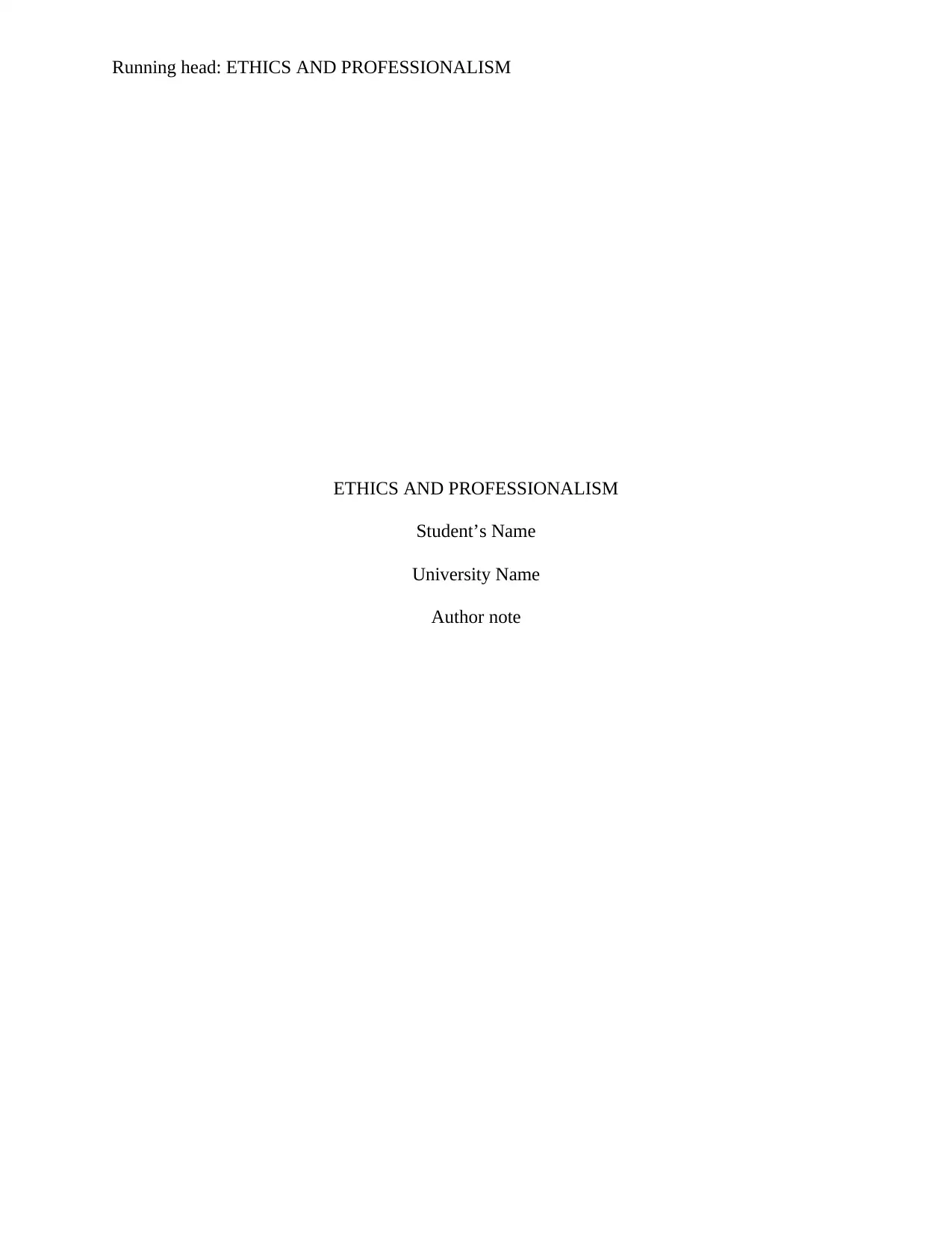
Running head: ETHICS AND PROFESSIONALISM
ETHICS AND PROFESSIONALISM
Student’s Name
University Name
Author note
ETHICS AND PROFESSIONALISM
Student’s Name
University Name
Author note
Paraphrase This Document
Need a fresh take? Get an instant paraphrase of this document with our AI Paraphraser
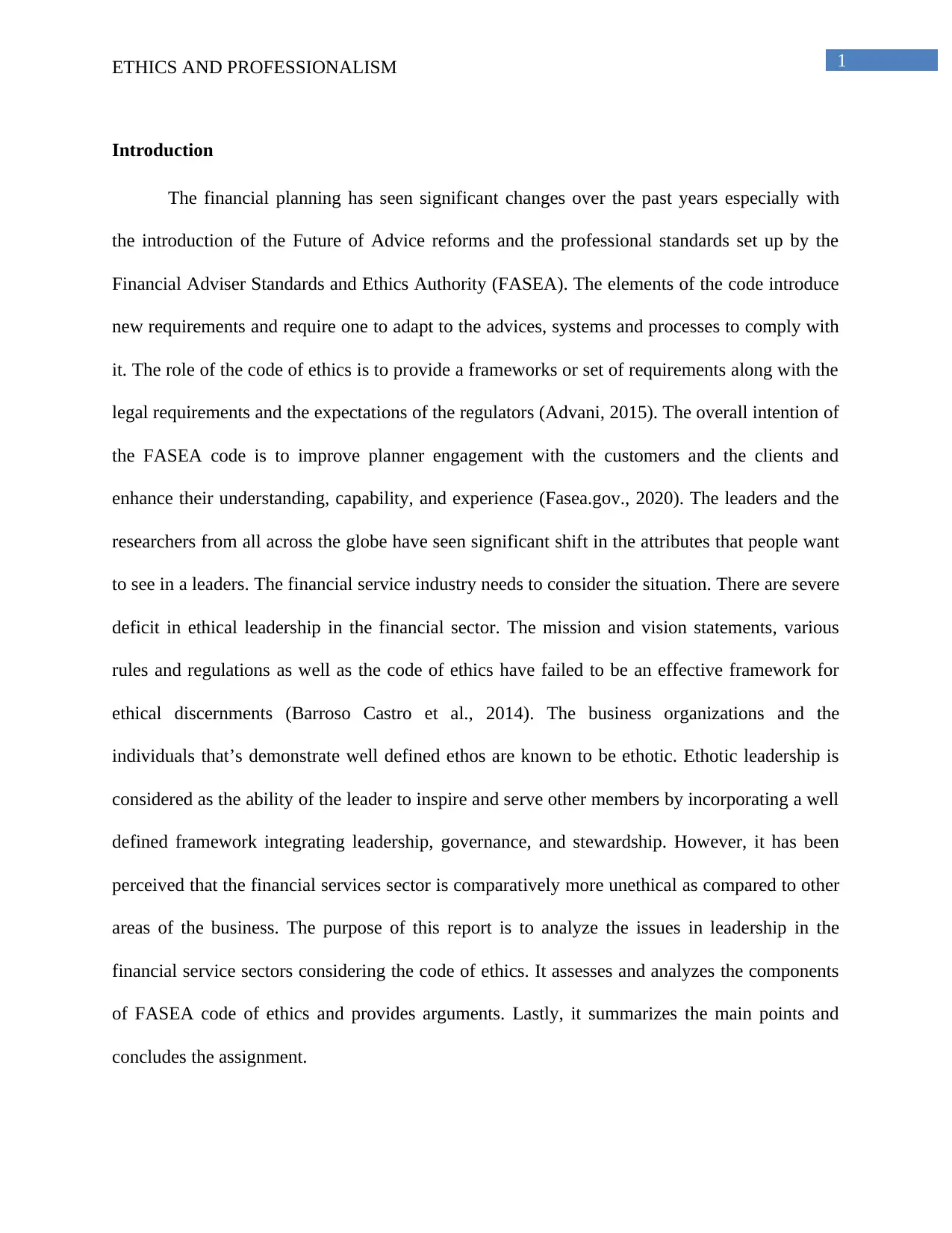
1ETHICS AND PROFESSIONALISM
Introduction
The financial planning has seen significant changes over the past years especially with
the introduction of the Future of Advice reforms and the professional standards set up by the
Financial Adviser Standards and Ethics Authority (FASEA). The elements of the code introduce
new requirements and require one to adapt to the advices, systems and processes to comply with
it. The role of the code of ethics is to provide a frameworks or set of requirements along with the
legal requirements and the expectations of the regulators (Advani, 2015). The overall intention of
the FASEA code is to improve planner engagement with the customers and the clients and
enhance their understanding, capability, and experience (Fasea.gov., 2020). The leaders and the
researchers from all across the globe have seen significant shift in the attributes that people want
to see in a leaders. The financial service industry needs to consider the situation. There are severe
deficit in ethical leadership in the financial sector. The mission and vision statements, various
rules and regulations as well as the code of ethics have failed to be an effective framework for
ethical discernments (Barroso Castro et al., 2014). The business organizations and the
individuals that’s demonstrate well defined ethos are known to be ethotic. Ethotic leadership is
considered as the ability of the leader to inspire and serve other members by incorporating a well
defined framework integrating leadership, governance, and stewardship. However, it has been
perceived that the financial services sector is comparatively more unethical as compared to other
areas of the business. The purpose of this report is to analyze the issues in leadership in the
financial service sectors considering the code of ethics. It assesses and analyzes the components
of FASEA code of ethics and provides arguments. Lastly, it summarizes the main points and
concludes the assignment.
Introduction
The financial planning has seen significant changes over the past years especially with
the introduction of the Future of Advice reforms and the professional standards set up by the
Financial Adviser Standards and Ethics Authority (FASEA). The elements of the code introduce
new requirements and require one to adapt to the advices, systems and processes to comply with
it. The role of the code of ethics is to provide a frameworks or set of requirements along with the
legal requirements and the expectations of the regulators (Advani, 2015). The overall intention of
the FASEA code is to improve planner engagement with the customers and the clients and
enhance their understanding, capability, and experience (Fasea.gov., 2020). The leaders and the
researchers from all across the globe have seen significant shift in the attributes that people want
to see in a leaders. The financial service industry needs to consider the situation. There are severe
deficit in ethical leadership in the financial sector. The mission and vision statements, various
rules and regulations as well as the code of ethics have failed to be an effective framework for
ethical discernments (Barroso Castro et al., 2014). The business organizations and the
individuals that’s demonstrate well defined ethos are known to be ethotic. Ethotic leadership is
considered as the ability of the leader to inspire and serve other members by incorporating a well
defined framework integrating leadership, governance, and stewardship. However, it has been
perceived that the financial services sector is comparatively more unethical as compared to other
areas of the business. The purpose of this report is to analyze the issues in leadership in the
financial service sectors considering the code of ethics. It assesses and analyzes the components
of FASEA code of ethics and provides arguments. Lastly, it summarizes the main points and
concludes the assignment.
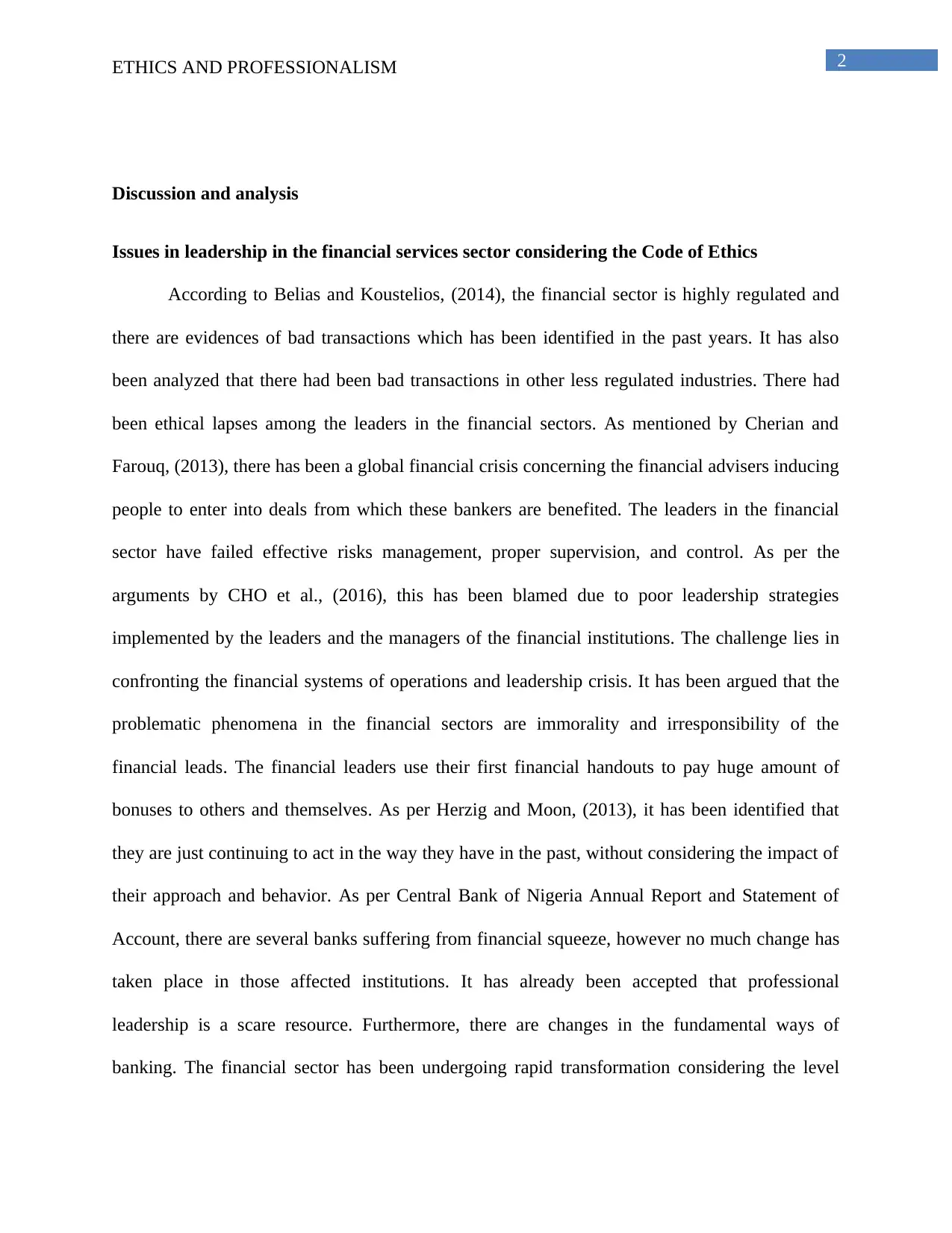
2ETHICS AND PROFESSIONALISM
Discussion and analysis
Issues in leadership in the financial services sector considering the Code of Ethics
According to Belias and Koustelios, (2014), the financial sector is highly regulated and
there are evidences of bad transactions which has been identified in the past years. It has also
been analyzed that there had been bad transactions in other less regulated industries. There had
been ethical lapses among the leaders in the financial sectors. As mentioned by Cherian and
Farouq, (2013), there has been a global financial crisis concerning the financial advisers inducing
people to enter into deals from which these bankers are benefited. The leaders in the financial
sector have failed effective risks management, proper supervision, and control. As per the
arguments by CHO et al., (2016), this has been blamed due to poor leadership strategies
implemented by the leaders and the managers of the financial institutions. The challenge lies in
confronting the financial systems of operations and leadership crisis. It has been argued that the
problematic phenomena in the financial sectors are immorality and irresponsibility of the
financial leads. The financial leaders use their first financial handouts to pay huge amount of
bonuses to others and themselves. As per Herzig and Moon, (2013), it has been identified that
they are just continuing to act in the way they have in the past, without considering the impact of
their approach and behavior. As per Central Bank of Nigeria Annual Report and Statement of
Account, there are several banks suffering from financial squeeze, however no much change has
taken place in those affected institutions. It has already been accepted that professional
leadership is a scare resource. Furthermore, there are changes in the fundamental ways of
banking. The financial sector has been undergoing rapid transformation considering the level
Discussion and analysis
Issues in leadership in the financial services sector considering the Code of Ethics
According to Belias and Koustelios, (2014), the financial sector is highly regulated and
there are evidences of bad transactions which has been identified in the past years. It has also
been analyzed that there had been bad transactions in other less regulated industries. There had
been ethical lapses among the leaders in the financial sectors. As mentioned by Cherian and
Farouq, (2013), there has been a global financial crisis concerning the financial advisers inducing
people to enter into deals from which these bankers are benefited. The leaders in the financial
sector have failed effective risks management, proper supervision, and control. As per the
arguments by CHO et al., (2016), this has been blamed due to poor leadership strategies
implemented by the leaders and the managers of the financial institutions. The challenge lies in
confronting the financial systems of operations and leadership crisis. It has been argued that the
problematic phenomena in the financial sectors are immorality and irresponsibility of the
financial leads. The financial leaders use their first financial handouts to pay huge amount of
bonuses to others and themselves. As per Herzig and Moon, (2013), it has been identified that
they are just continuing to act in the way they have in the past, without considering the impact of
their approach and behavior. As per Central Bank of Nigeria Annual Report and Statement of
Account, there are several banks suffering from financial squeeze, however no much change has
taken place in those affected institutions. It has already been accepted that professional
leadership is a scare resource. Furthermore, there are changes in the fundamental ways of
banking. The financial sector has been undergoing rapid transformation considering the level
⊘ This is a preview!⊘
Do you want full access?
Subscribe today to unlock all pages.

Trusted by 1+ million students worldwide
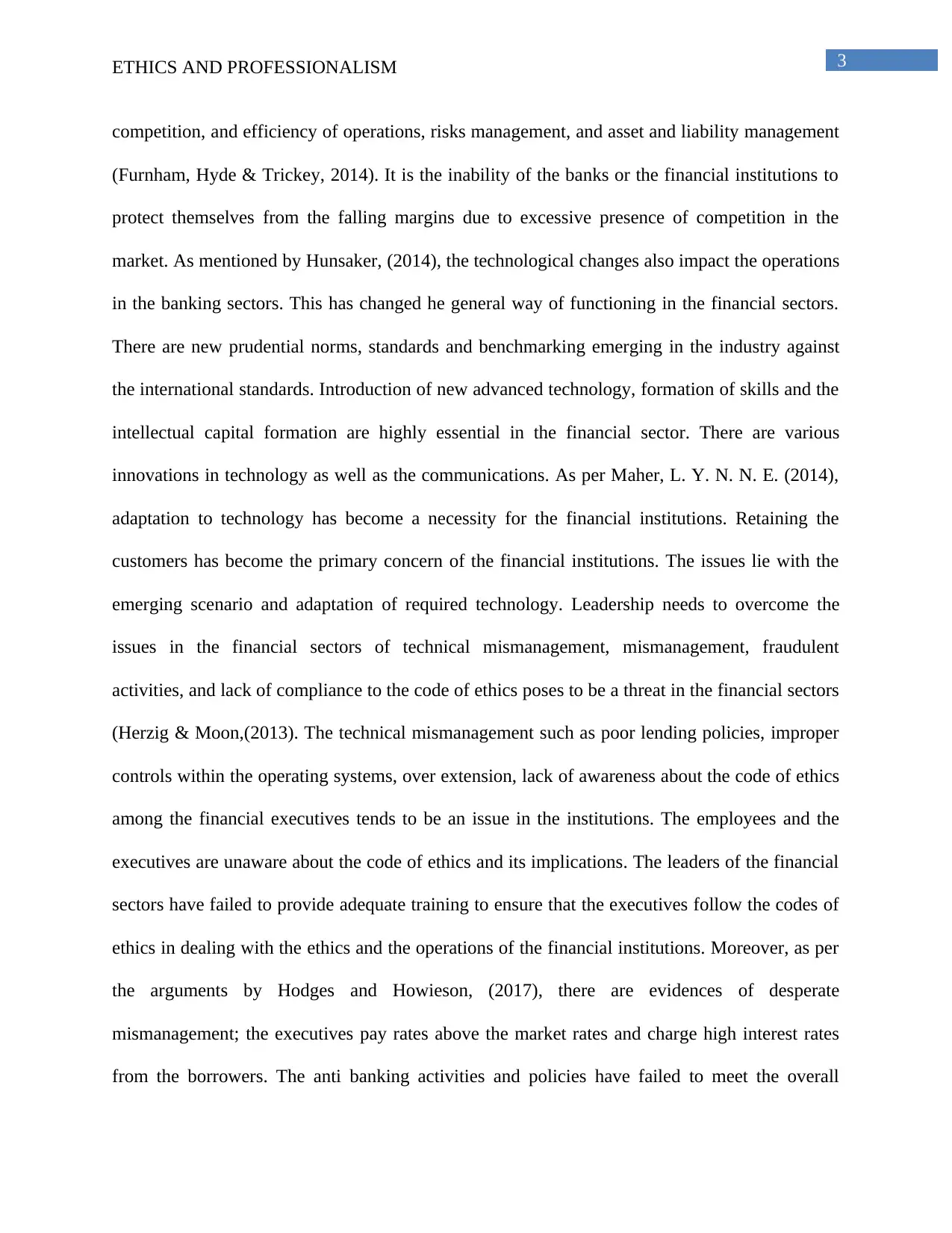
3ETHICS AND PROFESSIONALISM
competition, and efficiency of operations, risks management, and asset and liability management
(Furnham, Hyde & Trickey, 2014). It is the inability of the banks or the financial institutions to
protect themselves from the falling margins due to excessive presence of competition in the
market. As mentioned by Hunsaker, (2014), the technological changes also impact the operations
in the banking sectors. This has changed he general way of functioning in the financial sectors.
There are new prudential norms, standards and benchmarking emerging in the industry against
the international standards. Introduction of new advanced technology, formation of skills and the
intellectual capital formation are highly essential in the financial sector. There are various
innovations in technology as well as the communications. As per Maher, L. Y. N. N. E. (2014),
adaptation to technology has become a necessity for the financial institutions. Retaining the
customers has become the primary concern of the financial institutions. The issues lie with the
emerging scenario and adaptation of required technology. Leadership needs to overcome the
issues in the financial sectors of technical mismanagement, mismanagement, fraudulent
activities, and lack of compliance to the code of ethics poses to be a threat in the financial sectors
(Herzig & Moon,(2013). The technical mismanagement such as poor lending policies, improper
controls within the operating systems, over extension, lack of awareness about the code of ethics
among the financial executives tends to be an issue in the institutions. The employees and the
executives are unaware about the code of ethics and its implications. The leaders of the financial
sectors have failed to provide adequate training to ensure that the executives follow the codes of
ethics in dealing with the ethics and the operations of the financial institutions. Moreover, as per
the arguments by Hodges and Howieson, (2017), there are evidences of desperate
mismanagement; the executives pay rates above the market rates and charge high interest rates
from the borrowers. The anti banking activities and policies have failed to meet the overall
competition, and efficiency of operations, risks management, and asset and liability management
(Furnham, Hyde & Trickey, 2014). It is the inability of the banks or the financial institutions to
protect themselves from the falling margins due to excessive presence of competition in the
market. As mentioned by Hunsaker, (2014), the technological changes also impact the operations
in the banking sectors. This has changed he general way of functioning in the financial sectors.
There are new prudential norms, standards and benchmarking emerging in the industry against
the international standards. Introduction of new advanced technology, formation of skills and the
intellectual capital formation are highly essential in the financial sector. There are various
innovations in technology as well as the communications. As per Maher, L. Y. N. N. E. (2014),
adaptation to technology has become a necessity for the financial institutions. Retaining the
customers has become the primary concern of the financial institutions. The issues lie with the
emerging scenario and adaptation of required technology. Leadership needs to overcome the
issues in the financial sectors of technical mismanagement, mismanagement, fraudulent
activities, and lack of compliance to the code of ethics poses to be a threat in the financial sectors
(Herzig & Moon,(2013). The technical mismanagement such as poor lending policies, improper
controls within the operating systems, over extension, lack of awareness about the code of ethics
among the financial executives tends to be an issue in the institutions. The employees and the
executives are unaware about the code of ethics and its implications. The leaders of the financial
sectors have failed to provide adequate training to ensure that the executives follow the codes of
ethics in dealing with the ethics and the operations of the financial institutions. Moreover, as per
the arguments by Hodges and Howieson, (2017), there are evidences of desperate
mismanagement; the executives pay rates above the market rates and charge high interest rates
from the borrowers. The anti banking activities and policies have failed to meet the overall
Paraphrase This Document
Need a fresh take? Get an instant paraphrase of this document with our AI Paraphraser
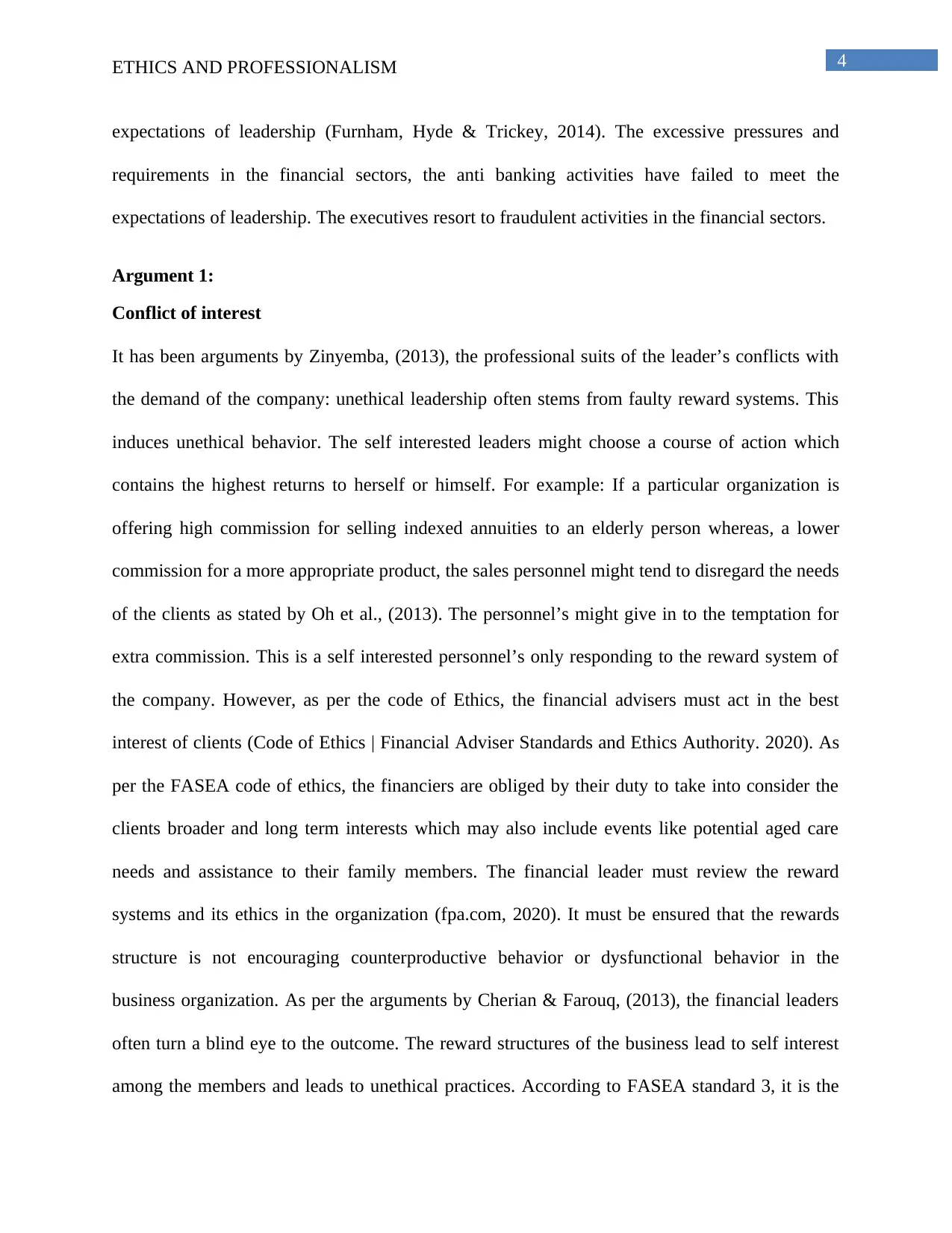
4ETHICS AND PROFESSIONALISM
expectations of leadership (Furnham, Hyde & Trickey, 2014). The excessive pressures and
requirements in the financial sectors, the anti banking activities have failed to meet the
expectations of leadership. The executives resort to fraudulent activities in the financial sectors.
Argument 1:
Conflict of interest
It has been arguments by Zinyemba, (2013), the professional suits of the leader’s conflicts with
the demand of the company: unethical leadership often stems from faulty reward systems. This
induces unethical behavior. The self interested leaders might choose a course of action which
contains the highest returns to herself or himself. For example: If a particular organization is
offering high commission for selling indexed annuities to an elderly person whereas, a lower
commission for a more appropriate product, the sales personnel might tend to disregard the needs
of the clients as stated by Oh et al., (2013). The personnel’s might give in to the temptation for
extra commission. This is a self interested personnel’s only responding to the reward system of
the company. However, as per the code of Ethics, the financial advisers must act in the best
interest of clients (Code of Ethics | Financial Adviser Standards and Ethics Authority. 2020). As
per the FASEA code of ethics, the financiers are obliged by their duty to take into consider the
clients broader and long term interests which may also include events like potential aged care
needs and assistance to their family members. The financial leader must review the reward
systems and its ethics in the organization (fpa.com, 2020). It must be ensured that the rewards
structure is not encouraging counterproductive behavior or dysfunctional behavior in the
business organization. As per the arguments by Cherian & Farouq, (2013), the financial leaders
often turn a blind eye to the outcome. The reward structures of the business lead to self interest
among the members and leads to unethical practices. According to FASEA standard 3, it is the
expectations of leadership (Furnham, Hyde & Trickey, 2014). The excessive pressures and
requirements in the financial sectors, the anti banking activities have failed to meet the
expectations of leadership. The executives resort to fraudulent activities in the financial sectors.
Argument 1:
Conflict of interest
It has been arguments by Zinyemba, (2013), the professional suits of the leader’s conflicts with
the demand of the company: unethical leadership often stems from faulty reward systems. This
induces unethical behavior. The self interested leaders might choose a course of action which
contains the highest returns to herself or himself. For example: If a particular organization is
offering high commission for selling indexed annuities to an elderly person whereas, a lower
commission for a more appropriate product, the sales personnel might tend to disregard the needs
of the clients as stated by Oh et al., (2013). The personnel’s might give in to the temptation for
extra commission. This is a self interested personnel’s only responding to the reward system of
the company. However, as per the code of Ethics, the financial advisers must act in the best
interest of clients (Code of Ethics | Financial Adviser Standards and Ethics Authority. 2020). As
per the FASEA code of ethics, the financiers are obliged by their duty to take into consider the
clients broader and long term interests which may also include events like potential aged care
needs and assistance to their family members. The financial leader must review the reward
systems and its ethics in the organization (fpa.com, 2020). It must be ensured that the rewards
structure is not encouraging counterproductive behavior or dysfunctional behavior in the
business organization. As per the arguments by Cherian & Farouq, (2013), the financial leaders
often turn a blind eye to the outcome. The reward structures of the business lead to self interest
among the members and leads to unethical practices. According to FASEA standard 3, it is the
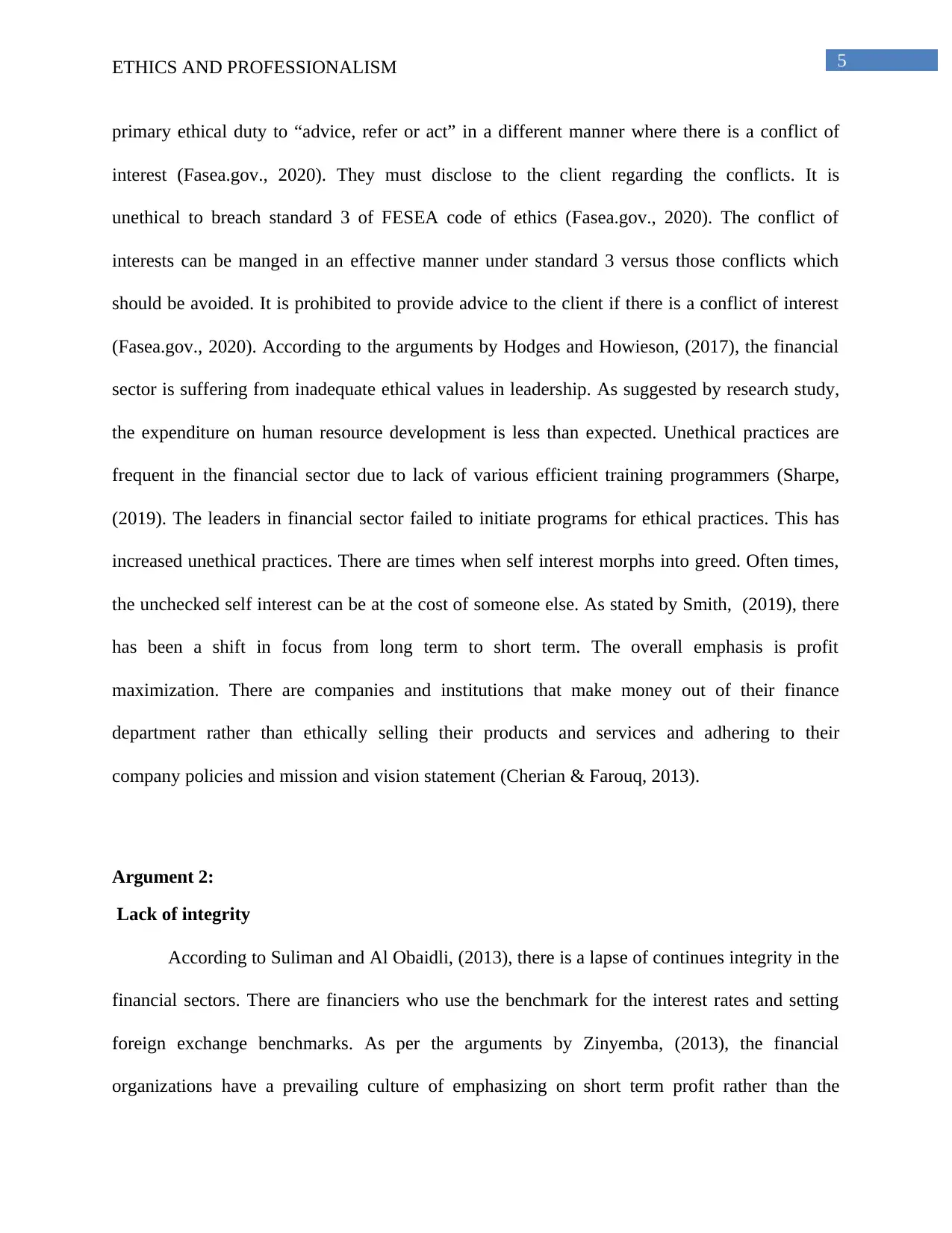
5ETHICS AND PROFESSIONALISM
primary ethical duty to “advice, refer or act” in a different manner where there is a conflict of
interest (Fasea.gov., 2020). They must disclose to the client regarding the conflicts. It is
unethical to breach standard 3 of FESEA code of ethics (Fasea.gov., 2020). The conflict of
interests can be manged in an effective manner under standard 3 versus those conflicts which
should be avoided. It is prohibited to provide advice to the client if there is a conflict of interest
(Fasea.gov., 2020). According to the arguments by Hodges and Howieson, (2017), the financial
sector is suffering from inadequate ethical values in leadership. As suggested by research study,
the expenditure on human resource development is less than expected. Unethical practices are
frequent in the financial sector due to lack of various efficient training programmers (Sharpe,
(2019). The leaders in financial sector failed to initiate programs for ethical practices. This has
increased unethical practices. There are times when self interest morphs into greed. Often times,
the unchecked self interest can be at the cost of someone else. As stated by Smith, (2019), there
has been a shift in focus from long term to short term. The overall emphasis is profit
maximization. There are companies and institutions that make money out of their finance
department rather than ethically selling their products and services and adhering to their
company policies and mission and vision statement (Cherian & Farouq, 2013).
Argument 2:
Lack of integrity
According to Suliman and Al Obaidli, (2013), there is a lapse of continues integrity in the
financial sectors. There are financiers who use the benchmark for the interest rates and setting
foreign exchange benchmarks. As per the arguments by Zinyemba, (2013), the financial
organizations have a prevailing culture of emphasizing on short term profit rather than the
primary ethical duty to “advice, refer or act” in a different manner where there is a conflict of
interest (Fasea.gov., 2020). They must disclose to the client regarding the conflicts. It is
unethical to breach standard 3 of FESEA code of ethics (Fasea.gov., 2020). The conflict of
interests can be manged in an effective manner under standard 3 versus those conflicts which
should be avoided. It is prohibited to provide advice to the client if there is a conflict of interest
(Fasea.gov., 2020). According to the arguments by Hodges and Howieson, (2017), the financial
sector is suffering from inadequate ethical values in leadership. As suggested by research study,
the expenditure on human resource development is less than expected. Unethical practices are
frequent in the financial sector due to lack of various efficient training programmers (Sharpe,
(2019). The leaders in financial sector failed to initiate programs for ethical practices. This has
increased unethical practices. There are times when self interest morphs into greed. Often times,
the unchecked self interest can be at the cost of someone else. As stated by Smith, (2019), there
has been a shift in focus from long term to short term. The overall emphasis is profit
maximization. There are companies and institutions that make money out of their finance
department rather than ethically selling their products and services and adhering to their
company policies and mission and vision statement (Cherian & Farouq, 2013).
Argument 2:
Lack of integrity
According to Suliman and Al Obaidli, (2013), there is a lapse of continues integrity in the
financial sectors. There are financiers who use the benchmark for the interest rates and setting
foreign exchange benchmarks. As per the arguments by Zinyemba, (2013), the financial
organizations have a prevailing culture of emphasizing on short term profit rather than the
⊘ This is a preview!⊘
Do you want full access?
Subscribe today to unlock all pages.

Trusted by 1+ million students worldwide
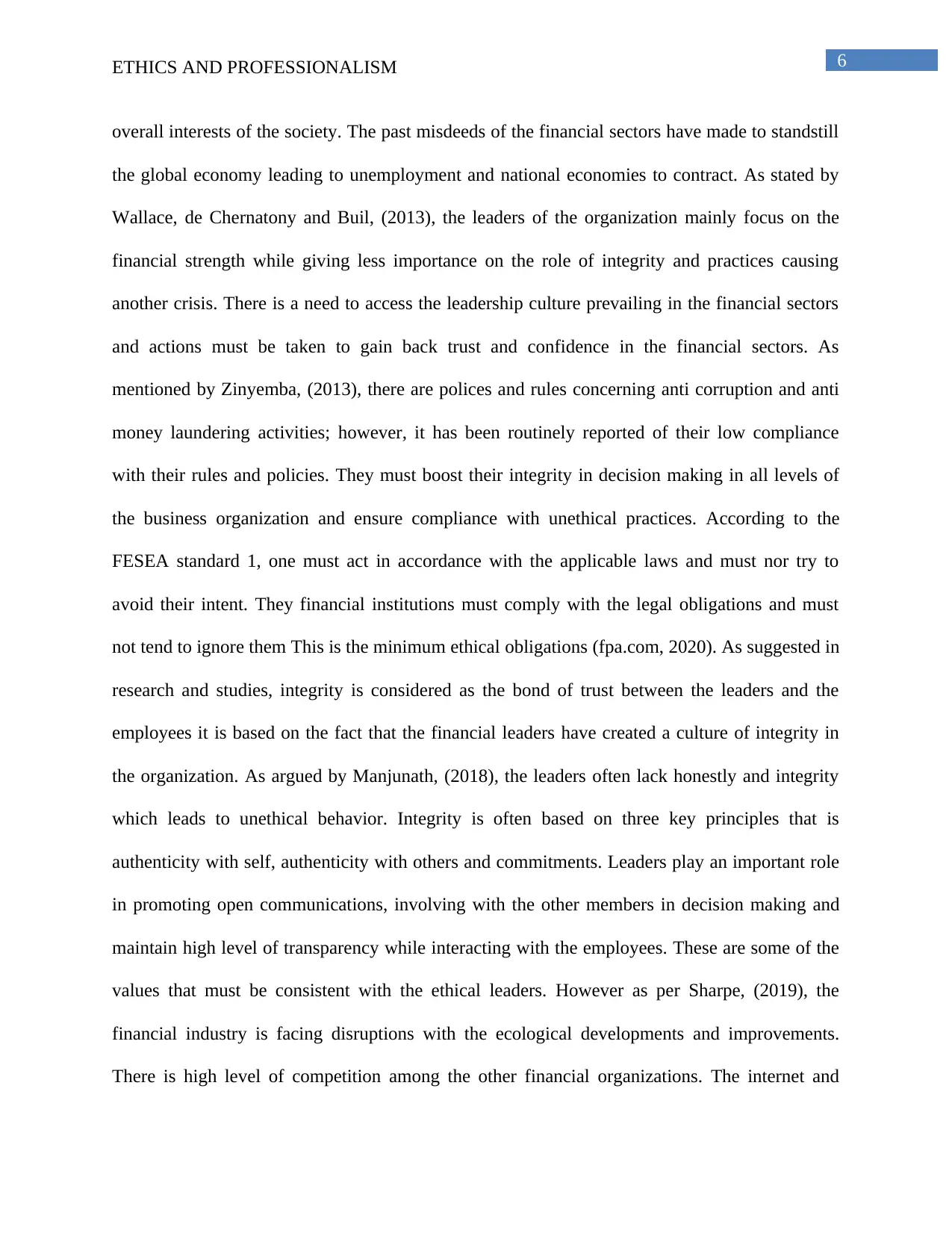
6ETHICS AND PROFESSIONALISM
overall interests of the society. The past misdeeds of the financial sectors have made to standstill
the global economy leading to unemployment and national economies to contract. As stated by
Wallace, de Chernatony and Buil, (2013), the leaders of the organization mainly focus on the
financial strength while giving less importance on the role of integrity and practices causing
another crisis. There is a need to access the leadership culture prevailing in the financial sectors
and actions must be taken to gain back trust and confidence in the financial sectors. As
mentioned by Zinyemba, (2013), there are polices and rules concerning anti corruption and anti
money laundering activities; however, it has been routinely reported of their low compliance
with their rules and policies. They must boost their integrity in decision making in all levels of
the business organization and ensure compliance with unethical practices. According to the
FESEA standard 1, one must act in accordance with the applicable laws and must nor try to
avoid their intent. They financial institutions must comply with the legal obligations and must
not tend to ignore them This is the minimum ethical obligations (fpa.com, 2020). As suggested in
research and studies, integrity is considered as the bond of trust between the leaders and the
employees it is based on the fact that the financial leaders have created a culture of integrity in
the organization. As argued by Manjunath, (2018), the leaders often lack honestly and integrity
which leads to unethical behavior. Integrity is often based on three key principles that is
authenticity with self, authenticity with others and commitments. Leaders play an important role
in promoting open communications, involving with the other members in decision making and
maintain high level of transparency while interacting with the employees. These are some of the
values that must be consistent with the ethical leaders. However as per Sharpe, (2019), the
financial industry is facing disruptions with the ecological developments and improvements.
There is high level of competition among the other financial organizations. The internet and
overall interests of the society. The past misdeeds of the financial sectors have made to standstill
the global economy leading to unemployment and national economies to contract. As stated by
Wallace, de Chernatony and Buil, (2013), the leaders of the organization mainly focus on the
financial strength while giving less importance on the role of integrity and practices causing
another crisis. There is a need to access the leadership culture prevailing in the financial sectors
and actions must be taken to gain back trust and confidence in the financial sectors. As
mentioned by Zinyemba, (2013), there are polices and rules concerning anti corruption and anti
money laundering activities; however, it has been routinely reported of their low compliance
with their rules and policies. They must boost their integrity in decision making in all levels of
the business organization and ensure compliance with unethical practices. According to the
FESEA standard 1, one must act in accordance with the applicable laws and must nor try to
avoid their intent. They financial institutions must comply with the legal obligations and must
not tend to ignore them This is the minimum ethical obligations (fpa.com, 2020). As suggested in
research and studies, integrity is considered as the bond of trust between the leaders and the
employees it is based on the fact that the financial leaders have created a culture of integrity in
the organization. As argued by Manjunath, (2018), the leaders often lack honestly and integrity
which leads to unethical behavior. Integrity is often based on three key principles that is
authenticity with self, authenticity with others and commitments. Leaders play an important role
in promoting open communications, involving with the other members in decision making and
maintain high level of transparency while interacting with the employees. These are some of the
values that must be consistent with the ethical leaders. However as per Sharpe, (2019), the
financial industry is facing disruptions with the ecological developments and improvements.
There is high level of competition among the other financial organizations. The internet and
Paraphrase This Document
Need a fresh take? Get an instant paraphrase of this document with our AI Paraphraser
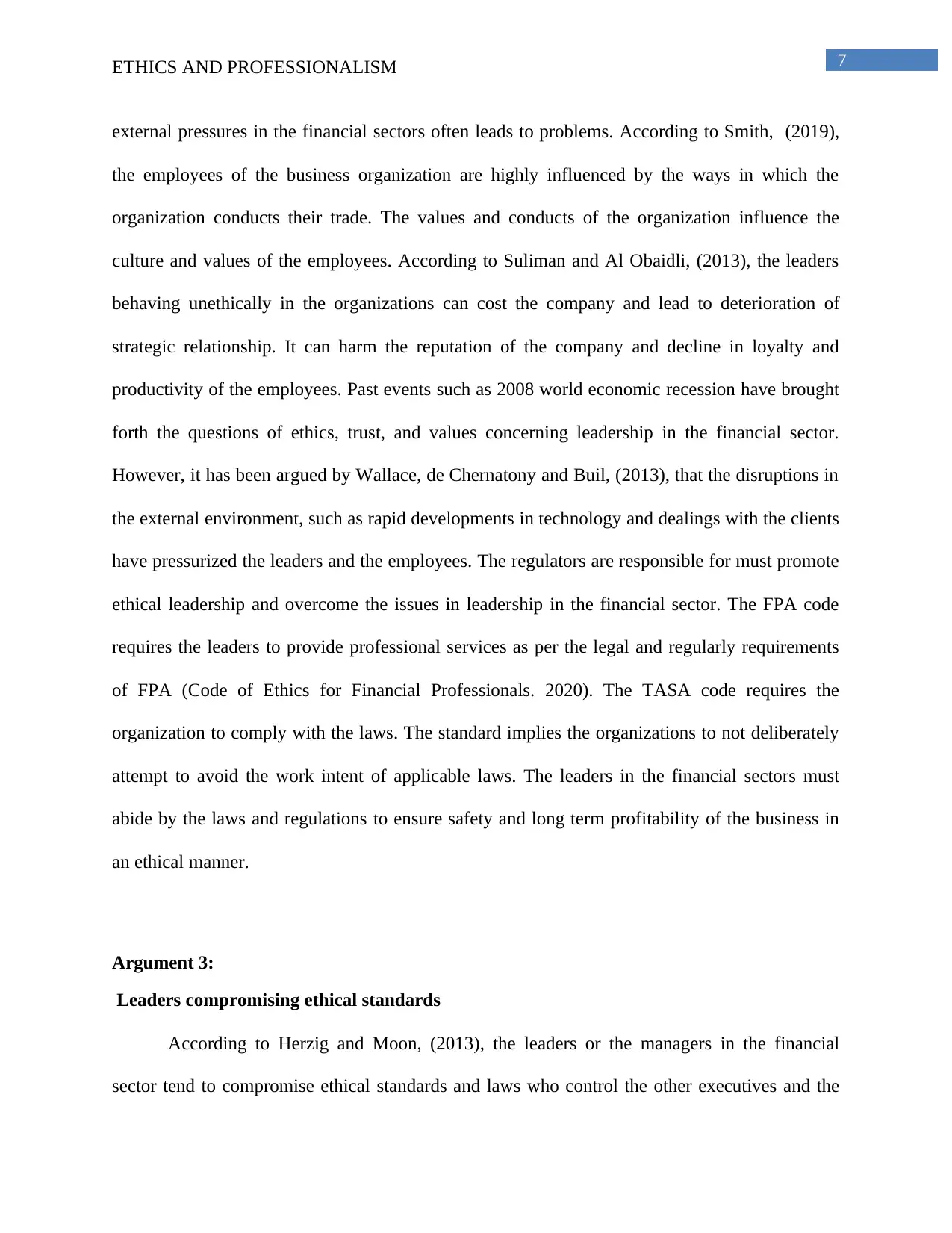
7ETHICS AND PROFESSIONALISM
external pressures in the financial sectors often leads to problems. According to Smith, (2019),
the employees of the business organization are highly influenced by the ways in which the
organization conducts their trade. The values and conducts of the organization influence the
culture and values of the employees. According to Suliman and Al Obaidli, (2013), the leaders
behaving unethically in the organizations can cost the company and lead to deterioration of
strategic relationship. It can harm the reputation of the company and decline in loyalty and
productivity of the employees. Past events such as 2008 world economic recession have brought
forth the questions of ethics, trust, and values concerning leadership in the financial sector.
However, it has been argued by Wallace, de Chernatony and Buil, (2013), that the disruptions in
the external environment, such as rapid developments in technology and dealings with the clients
have pressurized the leaders and the employees. The regulators are responsible for must promote
ethical leadership and overcome the issues in leadership in the financial sector. The FPA code
requires the leaders to provide professional services as per the legal and regularly requirements
of FPA (Code of Ethics for Financial Professionals. 2020). The TASA code requires the
organization to comply with the laws. The standard implies the organizations to not deliberately
attempt to avoid the work intent of applicable laws. The leaders in the financial sectors must
abide by the laws and regulations to ensure safety and long term profitability of the business in
an ethical manner.
Argument 3:
Leaders compromising ethical standards
According to Herzig and Moon, (2013), the leaders or the managers in the financial
sector tend to compromise ethical standards and laws who control the other executives and the
external pressures in the financial sectors often leads to problems. According to Smith, (2019),
the employees of the business organization are highly influenced by the ways in which the
organization conducts their trade. The values and conducts of the organization influence the
culture and values of the employees. According to Suliman and Al Obaidli, (2013), the leaders
behaving unethically in the organizations can cost the company and lead to deterioration of
strategic relationship. It can harm the reputation of the company and decline in loyalty and
productivity of the employees. Past events such as 2008 world economic recession have brought
forth the questions of ethics, trust, and values concerning leadership in the financial sector.
However, it has been argued by Wallace, de Chernatony and Buil, (2013), that the disruptions in
the external environment, such as rapid developments in technology and dealings with the clients
have pressurized the leaders and the employees. The regulators are responsible for must promote
ethical leadership and overcome the issues in leadership in the financial sector. The FPA code
requires the leaders to provide professional services as per the legal and regularly requirements
of FPA (Code of Ethics for Financial Professionals. 2020). The TASA code requires the
organization to comply with the laws. The standard implies the organizations to not deliberately
attempt to avoid the work intent of applicable laws. The leaders in the financial sectors must
abide by the laws and regulations to ensure safety and long term profitability of the business in
an ethical manner.
Argument 3:
Leaders compromising ethical standards
According to Herzig and Moon, (2013), the leaders or the managers in the financial
sector tend to compromise ethical standards and laws who control the other executives and the
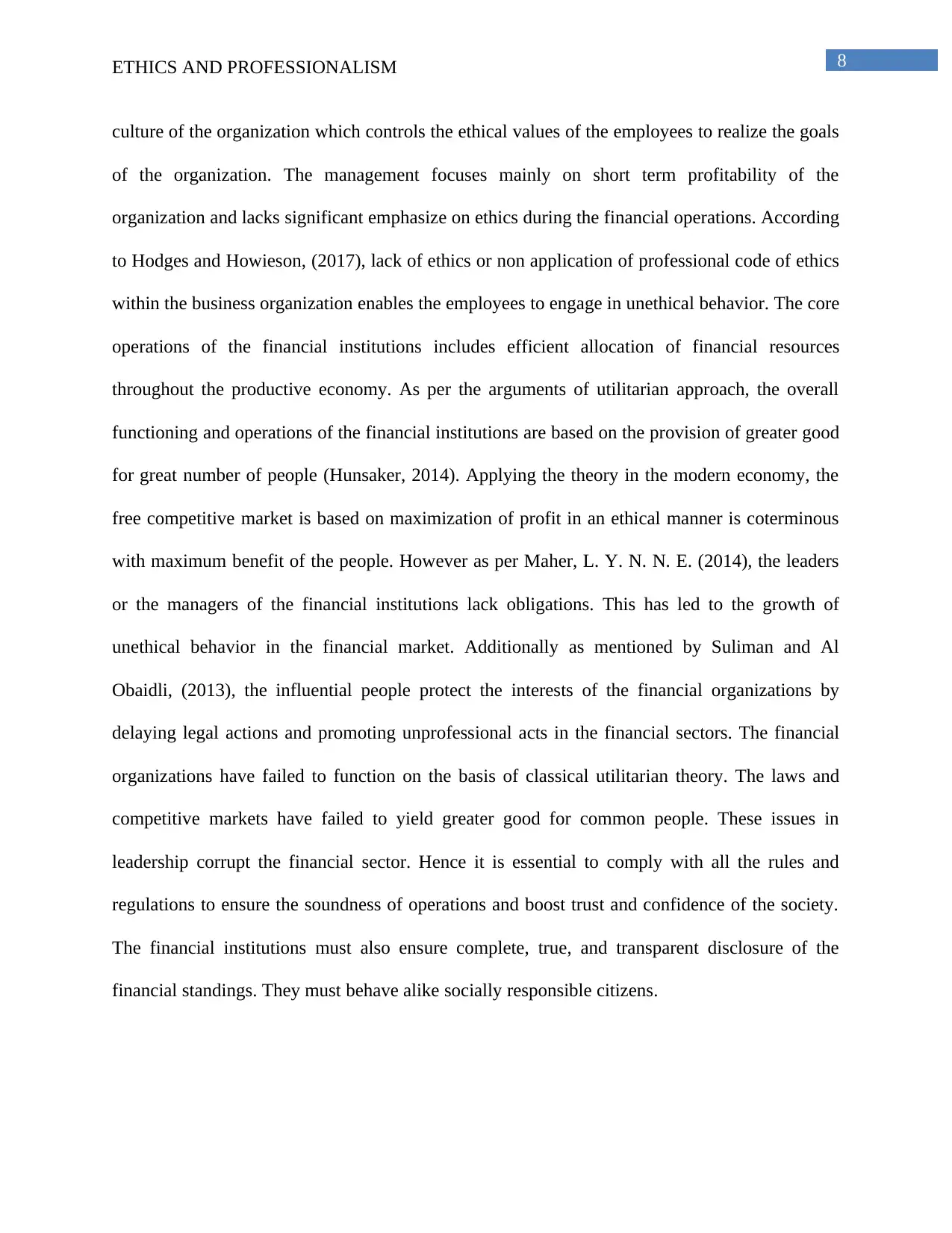
8ETHICS AND PROFESSIONALISM
culture of the organization which controls the ethical values of the employees to realize the goals
of the organization. The management focuses mainly on short term profitability of the
organization and lacks significant emphasize on ethics during the financial operations. According
to Hodges and Howieson, (2017), lack of ethics or non application of professional code of ethics
within the business organization enables the employees to engage in unethical behavior. The core
operations of the financial institutions includes efficient allocation of financial resources
throughout the productive economy. As per the arguments of utilitarian approach, the overall
functioning and operations of the financial institutions are based on the provision of greater good
for great number of people (Hunsaker, 2014). Applying the theory in the modern economy, the
free competitive market is based on maximization of profit in an ethical manner is coterminous
with maximum benefit of the people. However as per Maher, L. Y. N. N. E. (2014), the leaders
or the managers of the financial institutions lack obligations. This has led to the growth of
unethical behavior in the financial market. Additionally as mentioned by Suliman and Al
Obaidli, (2013), the influential people protect the interests of the financial organizations by
delaying legal actions and promoting unprofessional acts in the financial sectors. The financial
organizations have failed to function on the basis of classical utilitarian theory. The laws and
competitive markets have failed to yield greater good for common people. These issues in
leadership corrupt the financial sector. Hence it is essential to comply with all the rules and
regulations to ensure the soundness of operations and boost trust and confidence of the society.
The financial institutions must also ensure complete, true, and transparent disclosure of the
financial standings. They must behave alike socially responsible citizens.
culture of the organization which controls the ethical values of the employees to realize the goals
of the organization. The management focuses mainly on short term profitability of the
organization and lacks significant emphasize on ethics during the financial operations. According
to Hodges and Howieson, (2017), lack of ethics or non application of professional code of ethics
within the business organization enables the employees to engage in unethical behavior. The core
operations of the financial institutions includes efficient allocation of financial resources
throughout the productive economy. As per the arguments of utilitarian approach, the overall
functioning and operations of the financial institutions are based on the provision of greater good
for great number of people (Hunsaker, 2014). Applying the theory in the modern economy, the
free competitive market is based on maximization of profit in an ethical manner is coterminous
with maximum benefit of the people. However as per Maher, L. Y. N. N. E. (2014), the leaders
or the managers of the financial institutions lack obligations. This has led to the growth of
unethical behavior in the financial market. Additionally as mentioned by Suliman and Al
Obaidli, (2013), the influential people protect the interests of the financial organizations by
delaying legal actions and promoting unprofessional acts in the financial sectors. The financial
organizations have failed to function on the basis of classical utilitarian theory. The laws and
competitive markets have failed to yield greater good for common people. These issues in
leadership corrupt the financial sector. Hence it is essential to comply with all the rules and
regulations to ensure the soundness of operations and boost trust and confidence of the society.
The financial institutions must also ensure complete, true, and transparent disclosure of the
financial standings. They must behave alike socially responsible citizens.
⊘ This is a preview!⊘
Do you want full access?
Subscribe today to unlock all pages.

Trusted by 1+ million students worldwide
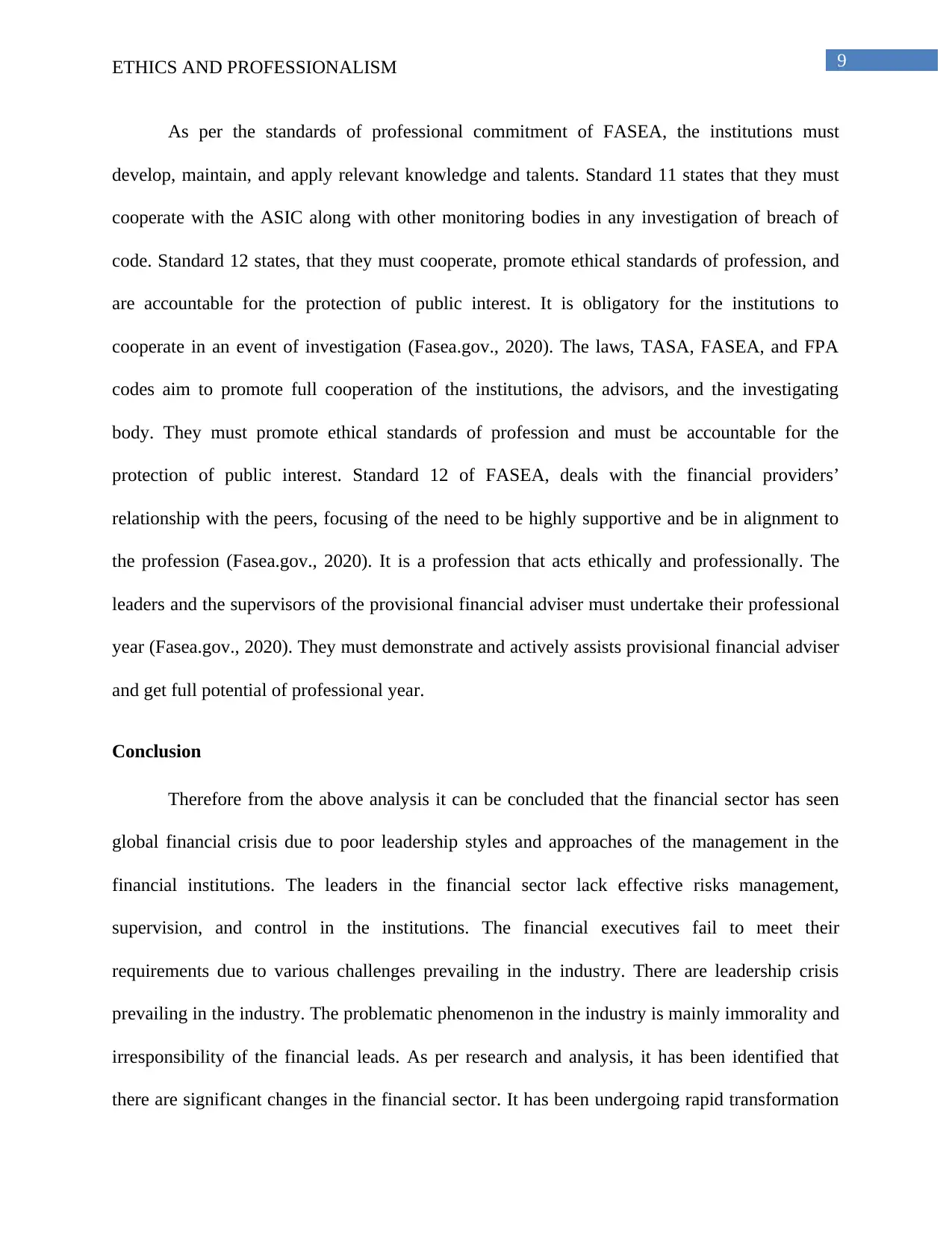
9ETHICS AND PROFESSIONALISM
As per the standards of professional commitment of FASEA, the institutions must
develop, maintain, and apply relevant knowledge and talents. Standard 11 states that they must
cooperate with the ASIC along with other monitoring bodies in any investigation of breach of
code. Standard 12 states, that they must cooperate, promote ethical standards of profession, and
are accountable for the protection of public interest. It is obligatory for the institutions to
cooperate in an event of investigation (Fasea.gov., 2020). The laws, TASA, FASEA, and FPA
codes aim to promote full cooperation of the institutions, the advisors, and the investigating
body. They must promote ethical standards of profession and must be accountable for the
protection of public interest. Standard 12 of FASEA, deals with the financial providers’
relationship with the peers, focusing of the need to be highly supportive and be in alignment to
the profession (Fasea.gov., 2020). It is a profession that acts ethically and professionally. The
leaders and the supervisors of the provisional financial adviser must undertake their professional
year (Fasea.gov., 2020). They must demonstrate and actively assists provisional financial adviser
and get full potential of professional year.
Conclusion
Therefore from the above analysis it can be concluded that the financial sector has seen
global financial crisis due to poor leadership styles and approaches of the management in the
financial institutions. The leaders in the financial sector lack effective risks management,
supervision, and control in the institutions. The financial executives fail to meet their
requirements due to various challenges prevailing in the industry. There are leadership crisis
prevailing in the industry. The problematic phenomenon in the industry is mainly immorality and
irresponsibility of the financial leads. As per research and analysis, it has been identified that
there are significant changes in the financial sector. It has been undergoing rapid transformation
As per the standards of professional commitment of FASEA, the institutions must
develop, maintain, and apply relevant knowledge and talents. Standard 11 states that they must
cooperate with the ASIC along with other monitoring bodies in any investigation of breach of
code. Standard 12 states, that they must cooperate, promote ethical standards of profession, and
are accountable for the protection of public interest. It is obligatory for the institutions to
cooperate in an event of investigation (Fasea.gov., 2020). The laws, TASA, FASEA, and FPA
codes aim to promote full cooperation of the institutions, the advisors, and the investigating
body. They must promote ethical standards of profession and must be accountable for the
protection of public interest. Standard 12 of FASEA, deals with the financial providers’
relationship with the peers, focusing of the need to be highly supportive and be in alignment to
the profession (Fasea.gov., 2020). It is a profession that acts ethically and professionally. The
leaders and the supervisors of the provisional financial adviser must undertake their professional
year (Fasea.gov., 2020). They must demonstrate and actively assists provisional financial adviser
and get full potential of professional year.
Conclusion
Therefore from the above analysis it can be concluded that the financial sector has seen
global financial crisis due to poor leadership styles and approaches of the management in the
financial institutions. The leaders in the financial sector lack effective risks management,
supervision, and control in the institutions. The financial executives fail to meet their
requirements due to various challenges prevailing in the industry. There are leadership crisis
prevailing in the industry. The problematic phenomenon in the industry is mainly immorality and
irresponsibility of the financial leads. As per research and analysis, it has been identified that
there are significant changes in the financial sector. It has been undergoing rapid transformation
Paraphrase This Document
Need a fresh take? Get an instant paraphrase of this document with our AI Paraphraser
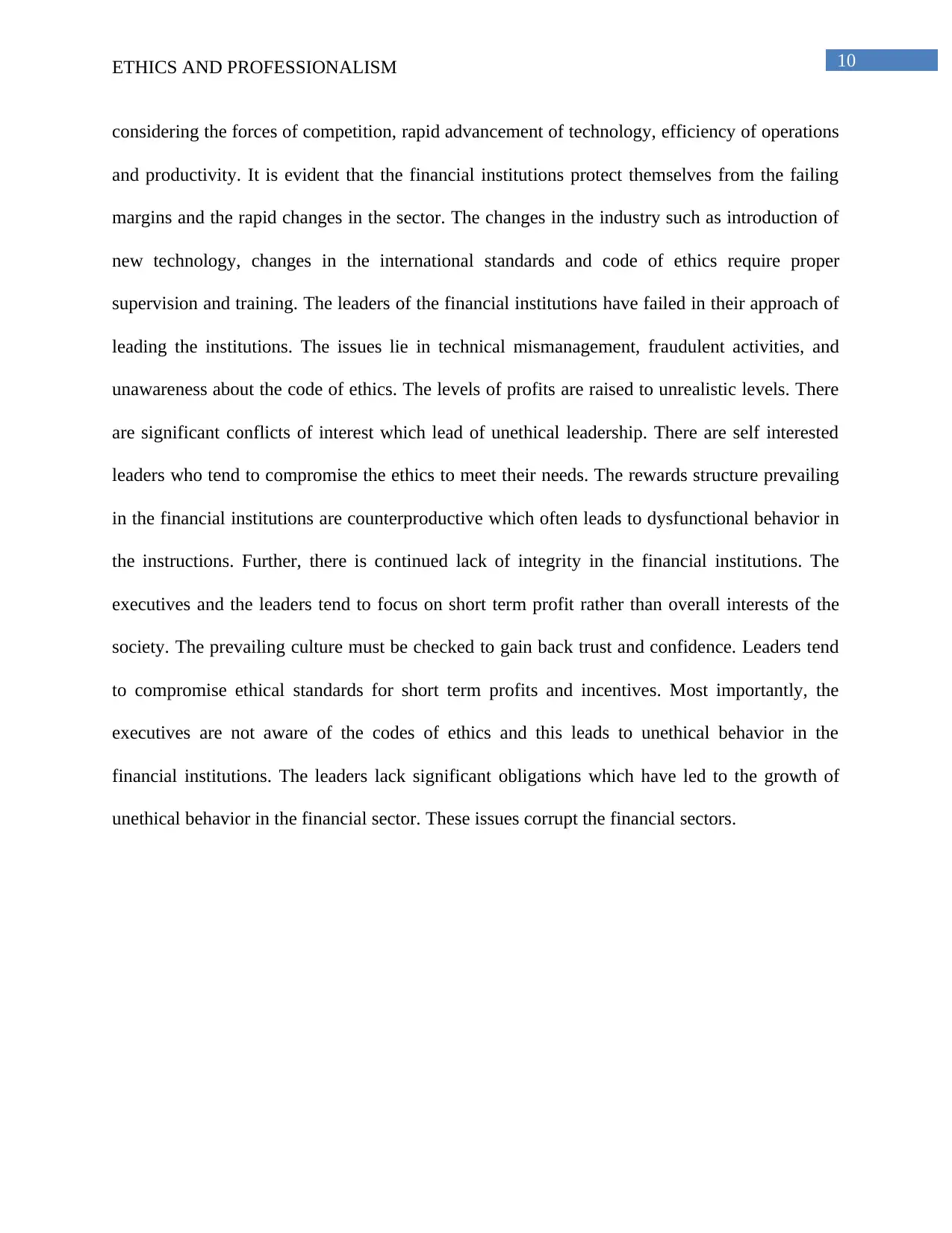
10ETHICS AND PROFESSIONALISM
considering the forces of competition, rapid advancement of technology, efficiency of operations
and productivity. It is evident that the financial institutions protect themselves from the failing
margins and the rapid changes in the sector. The changes in the industry such as introduction of
new technology, changes in the international standards and code of ethics require proper
supervision and training. The leaders of the financial institutions have failed in their approach of
leading the institutions. The issues lie in technical mismanagement, fraudulent activities, and
unawareness about the code of ethics. The levels of profits are raised to unrealistic levels. There
are significant conflicts of interest which lead of unethical leadership. There are self interested
leaders who tend to compromise the ethics to meet their needs. The rewards structure prevailing
in the financial institutions are counterproductive which often leads to dysfunctional behavior in
the instructions. Further, there is continued lack of integrity in the financial institutions. The
executives and the leaders tend to focus on short term profit rather than overall interests of the
society. The prevailing culture must be checked to gain back trust and confidence. Leaders tend
to compromise ethical standards for short term profits and incentives. Most importantly, the
executives are not aware of the codes of ethics and this leads to unethical behavior in the
financial institutions. The leaders lack significant obligations which have led to the growth of
unethical behavior in the financial sector. These issues corrupt the financial sectors.
considering the forces of competition, rapid advancement of technology, efficiency of operations
and productivity. It is evident that the financial institutions protect themselves from the failing
margins and the rapid changes in the sector. The changes in the industry such as introduction of
new technology, changes in the international standards and code of ethics require proper
supervision and training. The leaders of the financial institutions have failed in their approach of
leading the institutions. The issues lie in technical mismanagement, fraudulent activities, and
unawareness about the code of ethics. The levels of profits are raised to unrealistic levels. There
are significant conflicts of interest which lead of unethical leadership. There are self interested
leaders who tend to compromise the ethics to meet their needs. The rewards structure prevailing
in the financial institutions are counterproductive which often leads to dysfunctional behavior in
the instructions. Further, there is continued lack of integrity in the financial institutions. The
executives and the leaders tend to focus on short term profit rather than overall interests of the
society. The prevailing culture must be checked to gain back trust and confidence. Leaders tend
to compromise ethical standards for short term profits and incentives. Most importantly, the
executives are not aware of the codes of ethics and this leads to unethical behavior in the
financial institutions. The leaders lack significant obligations which have led to the growth of
unethical behavior in the financial sector. These issues corrupt the financial sectors.
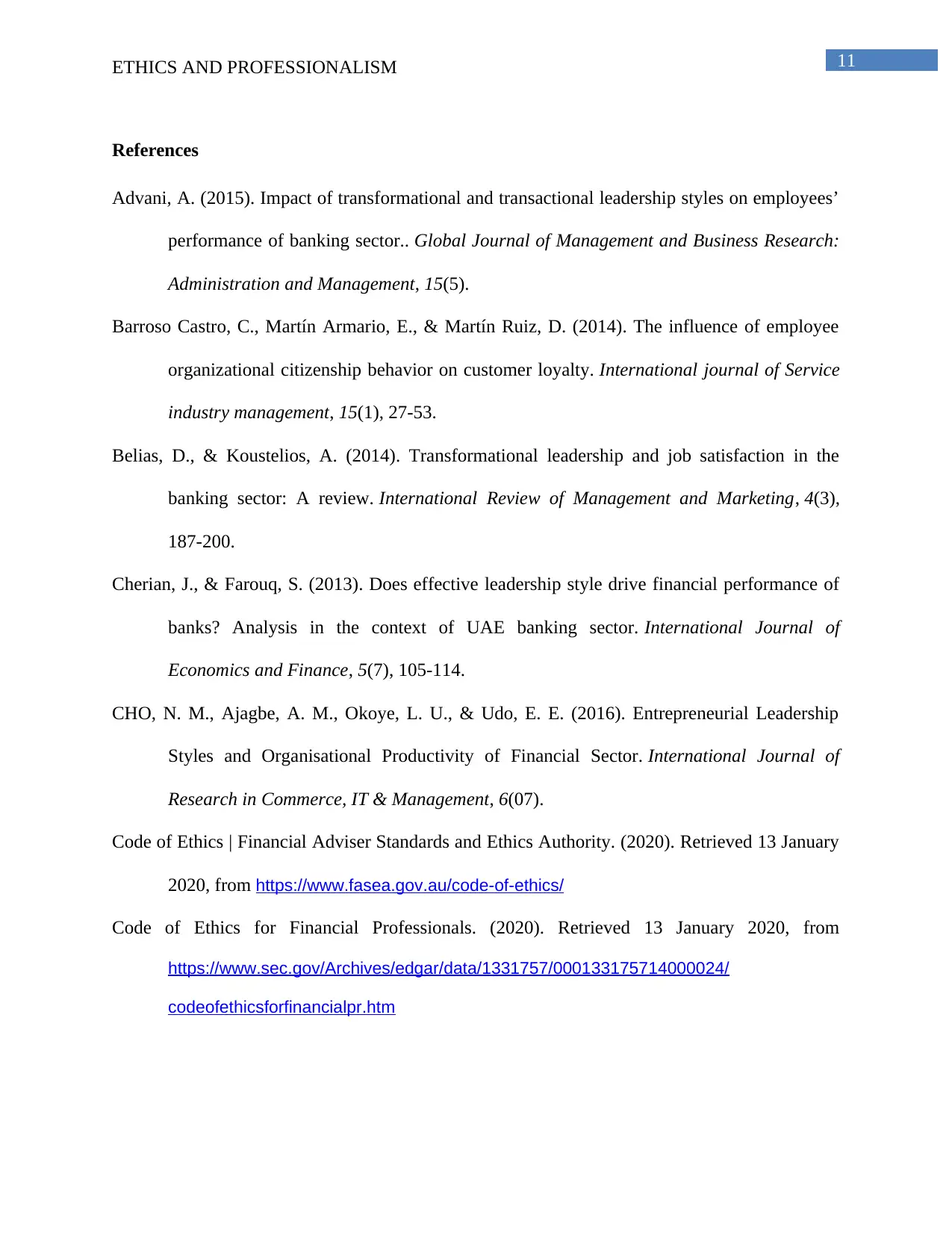
11ETHICS AND PROFESSIONALISM
References
Advani, A. (2015). Impact of transformational and transactional leadership styles on employees’
performance of banking sector.. Global Journal of Management and Business Research:
Administration and Management, 15(5).
Barroso Castro, C., Martín Armario, E., & Martín Ruiz, D. (2014). The influence of employee
organizational citizenship behavior on customer loyalty. International journal of Service
industry management, 15(1), 27-53.
Belias, D., & Koustelios, A. (2014). Transformational leadership and job satisfaction in the
banking sector: A review. International Review of Management and Marketing, 4(3),
187-200.
Cherian, J., & Farouq, S. (2013). Does effective leadership style drive financial performance of
banks? Analysis in the context of UAE banking sector. International Journal of
Economics and Finance, 5(7), 105-114.
CHO, N. M., Ajagbe, A. M., Okoye, L. U., & Udo, E. E. (2016). Entrepreneurial Leadership
Styles and Organisational Productivity of Financial Sector. International Journal of
Research in Commerce, IT & Management, 6(07).
Code of Ethics | Financial Adviser Standards and Ethics Authority. (2020). Retrieved 13 January
2020, from https://www.fasea.gov.au/code-of-ethics/
Code of Ethics for Financial Professionals. (2020). Retrieved 13 January 2020, from
https://www.sec.gov/Archives/edgar/data/1331757/000133175714000024/
codeofethicsforfinancialpr.htm
References
Advani, A. (2015). Impact of transformational and transactional leadership styles on employees’
performance of banking sector.. Global Journal of Management and Business Research:
Administration and Management, 15(5).
Barroso Castro, C., Martín Armario, E., & Martín Ruiz, D. (2014). The influence of employee
organizational citizenship behavior on customer loyalty. International journal of Service
industry management, 15(1), 27-53.
Belias, D., & Koustelios, A. (2014). Transformational leadership and job satisfaction in the
banking sector: A review. International Review of Management and Marketing, 4(3),
187-200.
Cherian, J., & Farouq, S. (2013). Does effective leadership style drive financial performance of
banks? Analysis in the context of UAE banking sector. International Journal of
Economics and Finance, 5(7), 105-114.
CHO, N. M., Ajagbe, A. M., Okoye, L. U., & Udo, E. E. (2016). Entrepreneurial Leadership
Styles and Organisational Productivity of Financial Sector. International Journal of
Research in Commerce, IT & Management, 6(07).
Code of Ethics | Financial Adviser Standards and Ethics Authority. (2020). Retrieved 13 January
2020, from https://www.fasea.gov.au/code-of-ethics/
Code of Ethics for Financial Professionals. (2020). Retrieved 13 January 2020, from
https://www.sec.gov/Archives/edgar/data/1331757/000133175714000024/
codeofethicsforfinancialpr.htm
⊘ This is a preview!⊘
Do you want full access?
Subscribe today to unlock all pages.

Trusted by 1+ million students worldwide
1 out of 14
Related Documents
Your All-in-One AI-Powered Toolkit for Academic Success.
+13062052269
info@desklib.com
Available 24*7 on WhatsApp / Email
![[object Object]](/_next/static/media/star-bottom.7253800d.svg)
Unlock your academic potential
Copyright © 2020–2025 A2Z Services. All Rights Reserved. Developed and managed by ZUCOL.





